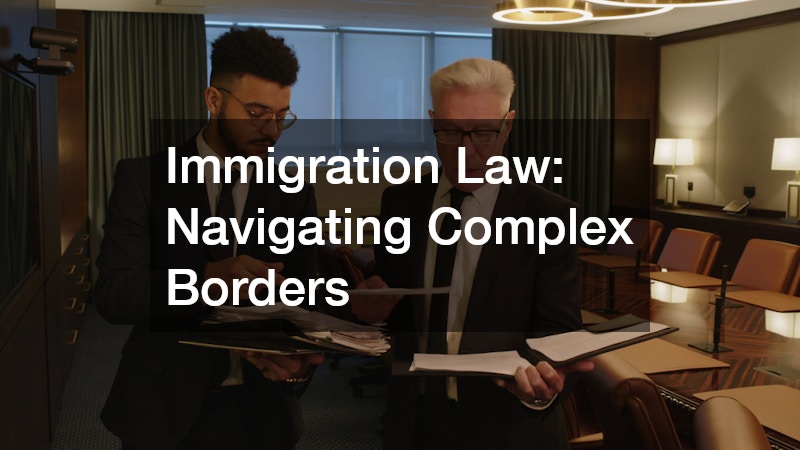In an increasingly complex world, navigating legal matters can feel overwhelming. Whether you’re facing a family crisis, a financial dilemma, or a personal injury, knowing when—and how—to seek legal representation is essential. Lawyers play a critical role in protecting your rights, helping you understand the law, and advocating on your behalf.
This comprehensive guide explains what different types of lawyers do and outlines common situations where hiring a legal expert isn’t just helpful—it’s necessary. We’ll cover everything from divorce lawyers and immigration lawyers to bankruptcy lawyers, probate attorneys, and more, so you can feel empowered to make informed decisions.
What Is a Lawyer and Why Might You Need One?
A lawyer is a licensed professional who provides legal advice and representation to individuals, businesses, and organizations. Their responsibilities vary widely depending on their area of specialization, but they all share the goal of helping clients navigate legal systems, draft critical documents, settle disputes, and uphold their legal rights.
You might need a local lawyer for something as routine as drafting a contract—or something as emotionally charged as a custody battle or accident lawsuit. Knowing which type of lawyer to contact in any given situation can save you time, money, and stress.
Family Law: When Personal Matters Turn Legal
What Is Family Law?
Family law encompasses a broad range of legal issues related to domestic relationships and family matters. This includes divorce, child custody, adoption, and spousal support. Because these cases often involve emotional stress and long-term consequences, it’s important to work with lawyers who specialize in this area.
Family lawyers aim to resolve disputes through negotiation and mediation, minimizing the need for combative court battles. They also help draft essential documents like wills and prenuptial agreements, ensuring clarity and legality. Having a specialized family lawyer can provide peace of mind during tumultuous times.
Through their expertise, family lawyers guide clients in making informed decisions that protect the interests of family members. They are often called upon to act in some of the most sensitive and challenging periods of life, providing necessary legal guidance. Seeking advice from a family lawyer can dramatically influence the outcome of your situation.
Divorce Lawyers
Divorce is one of the most common reasons people seek legal help. Divorce lawyers guide clients through the legal process of ending a marriage, including property division, spousal support, and legal separation. They ensure that settlements are fair and that clients understand their rights.
In contentious cases, hiring a skilled divorce lawyer is crucial to protect your interests and negotiate favorable outcomes. Even in amicable divorces, legal assistance helps prevent costly mistakes. These lawyers excel in navigating emotional terrain while focusing on logical resolutions.
Divorce lawyers also help clients explore alternative dispute resolutions like mediation to avoid prolonged court proceedings. Each divorce lawyer aims to facilitate a smoother transition for their clients, keeping stress to a minimum. Trusting a professional to handle delicate aspects of divorce leads to better-structured agreements.
Child Custody Lawyers
A child custody lawyer focuses on legal disputes involving parenting plans, custody arrangements, and visitation rights. These professionals advocate for the best interests of the child while supporting their client’s parental rights. The intricacies of custody laws require skilled navigation to protect children’s welfare.
Courts consider several factors when deciding custody, including the child’s welfare, each parent’s ability to provide care, and the child’s preference (depending on age). Having a child custody lawyer ensures you present a strong, well-supported case. Their expertise often includes collaborating with counselors and child specialists to provide better evaluations.
A child custody lawyer not only handles negotiations but also prepares necessary documentation and prepares clients for custody hearings. They work diligently to reduce the emotional burdens associated with custody battles. Involving a child custody lawyer early can lead to more effective custody arrangements.
Family Lawyers
Family lawyers often handle a wide range of issues, including prenuptial agreements, guardianship, and paternity disputes. Many also act as mediators, helping families resolve conflicts outside of court. If your legal issue involves familial relationships, a family lawyer is your best point of contact.
Family lawyers are equipped to deal with the sensitive nature of familial legal issues, often acting as both advocates and counselors. They offer objective advice that considers legal ramifications along with family dynamics. Protecting family bonds while ensuring legal compliance is their utmost priority.
Through a tailored approach, family lawyers can address unique aspects of each case, considering both long-term and immediate implications. They provide compassionate service to navigate delicate family matters, resulting in resolutions that aim for minimal disruption to family life. Their expertise is invaluable when emotions run high.
Immigration Law: Navigating Complex Borders

When to Hire an Immigration Lawyer
Immigration law is one of the most complicated areas in the U.S. legal system. A mistake on a form or missed deadline can derail years of effort. Whether you’re applying for a visa, facing deportation, or seeking citizenship, an immigration lawyer provides vital expertise.
These professionals stay current on evolving immigration policies and help clients with applications, appeals, and interviews. If English is not your first language or your immigration case is urgent, having legal representation can be life-changing. Ensuring all documentation is precise and complete is critical to the success of the process.
An immigration lawyer can guide you through interviews and represent you in disputes with immigration authorities. Their thorough understanding of global immigration issues provides clarity for clients navigating complex borders. Consulting an immigration lawyer can greatly enhance your chances of achieving a favorable outcome.
Bankruptcy and Financial Struggles: Getting a Fresh Start
What a Bankruptcy Lawyer Does
Mounting debt, creditor harassment, or the threat of foreclosure can make life incredibly stressful. A bankruptcy lawyer helps individuals and businesses file for bankruptcy, stop collection actions, and rebuild their financial lives. Their guidance offers a path to financial stability through legal means.
There are different types of bankruptcy filings (such as Chapter 7 or Chapter 13), each with distinct eligibility requirements and outcomes. An experienced bankruptcy lawyer will guide you through the options, prepare required documents, and represent you in court proceedings. Their expertise mitigates the risk of errors that could invalidate filings.
Filing without professional help often results in errors or denied applications. If you’re considering bankruptcy, consult a lawyer early to protect your assets and understand your rights. A bankruptcy lawyer paves the way to clearer financial horizons through informed legal action.
Probate and Estate Planning: What Happens After a Death

The Role of a Probate Attorney
When someone passes away, their estate must be legally transferred to heirs. A probate attorney assists in navigating the probate process—the court-supervised procedure for validating a will, paying debts, and distributing assets. These attorneys provide critical legal and administrative guidance during emotionally difficult times.
Even if the deceased had a will, legal disputes can arise. A probate attorney helps executors handle taxes, debts, and claims efficiently, avoiding unnecessary delays or conflicts. Their role is pivotal in ensuring that the wishes of the deceased are honored and executed as laid down in their will or estate plan.
Probate attorneys manage procedures that require rigorous adherence to legal standards and deadlines. They relieve families from administrative burdens, allowing them to focus on grieving. The assistance of a probate attorney ensures a seamless transition of assets within legal frameworks.
Personal Injury and Accidents: Protecting Your Rights
When You Need a Personal Injury Attorney
If you’ve been injured due to someone else’s negligence—whether in a car accident, slip and fall, or workplace incident—a personal injury attorney can help you pursue compensation. This may include medical expenses, lost wages, and pain and suffering. Prompt legal action with their support maximizes your chance of a satisfactory outcome.
Personal injury attorneys negotiate with insurance companies, gather evidence, and represent clients in court if necessary. Because they usually work on contingency fees (meaning you pay only if you win), these lawyers are accessible to most people in need of justice. Their expertise is vital to reaching appropriate settlements or court verdicts.
Don’t try to handle serious injuries or claims alone. Legal representation ensures you receive fair compensation and aren’t taken advantage of by insurers or corporations. Trusting a personal injury attorney allows for strategic case management that addresses all legal angles.
When to Hire a Local Lawyer

Why Local Matters
Legal systems and court procedures can vary significantly by state, county, or even city. That’s why hiring a local lawyer—someone familiar with the laws and courts in your area—is often the smartest choice. Their insight into regional legal nuances can make all the difference in case outcomes.
A local lawyer brings regional expertise, established relationships with court personnel, and a working knowledge of local regulations. Whether it’s a real estate transaction, small claims dispute, or local ordinance violation, hiring someone who knows the area’s legal landscape can provide a major advantage. This localized knowledge can streamline procedures and enhance advocacy efforts.
Relying on a local lawyer allows for tailored strategies that factor into jurisdictional specifics, resulting in more effective resolutions. Their ability to navigate the local judiciary and understand community-specific legal trends can significantly benefit your case. Trusting a local expert ensures comprehensive legal support reflective of your community’s context.
How to Choose the Right Lawyer for Your Needs
1. Identify Your Legal Issue
Before contacting anyone, define your legal problem. Are you going through a divorce? Injured in a car accident? Applying for citizenship? Pinpointing the issue helps you find the right legal specialty. Thorough understanding of your legal matter steers you towards appropriate legal advice.
Identifying your specific needs narrows down your search, allowing you to evaluate lawyers with the expertise you require. Confidence in your search saves you time and the frustration of incorrectly matched services. Clear identification of your keyword needs aids in selecting the right lawyer for the job.
Each specific legal issue requires different forms of assistance, making correct keyword identification crucial. This allows for a precise search and informed consultation processes. Focused identification ensures effective lawyer-client collaborations.
2. Research and Ask for Referrals
Ask trusted friends, family, or colleagues for referrals. You can also search bar association directories, legal aid websites, or law firm reviews. Be sure to verify credentials, experience, and areas of practice. Gathering multiple perspectives aids in forming a reliable shortlist.
Comprehensive research, coupled with referrals, builds confidence in choosing the right lawyer. The credibility and experience of a lawyer establish trust in their ability to handle your legal needs. This due diligence ensures you find a lawyer that aligns best with your requirements.
Using multiple sources of information provides a well-rounded view of potential lawyers. Referrals often provide insights into personal client experiences, supplementing online research. They collectively form an informed foundation for decision-making.
3. Schedule a Consultation
Most lawyers offer an initial consultation—sometimes free—to discuss your case. Come prepared with documents and questions. This meeting allows you to assess their communication style, expertise, and fit for your situation. Engaging in this firsthand encounter aids in gauging mutual suitability and understanding.
Consultations provide a non-committal space to explore potential legal partnerships. Reviewing their approach and responsiveness can provide insights into your comfort and compatibility. Maximizing this opportunity enhances your decision-making confidence.
The consultation phase is essential for clarifying doubts and establishing mutual expectations. This engagement offers you a glimpse into the lawyer’s operational style, aiding your final selection. Aligning professional behavior with your expectations influences your choice positively.
4. Understand the Fee Structure
Lawyers may charge by the hour, offer flat fees, or work on contingency. Always ask about billing practices, retainers, and what services are included. Transparent pricing avoids confusion down the line. Clear understanding of fee structures steers financial planning throughout legal proceedings.
Discussing finances openly establishes transparency from the outset, setting the stage for honest interactions. Grasping the nuances of payment plans ensures satisfaction with your legal expenditure. Informed discussions promote financial preparedness and reduce surprises.
Knowing different fee structures helps you choose within your budget constraints. This pragmatic approach paves the way for sustainable legal support. Awareness of financial implications increases the longevity of your legal relationship.
5. Trust Your Instincts
Beyond credentials, choose someone you feel comfortable working with. You’ll likely share sensitive information, so a trustworthy, respectful relationship is key to a successful outcome. Personal comfort is as pivotal as professional capability in forming effective legal partnerships.
Instincts guide you in establishing a rapport essential for open communications. Your comfort allows you to remain candid about details critical to your case. Mutual trust and respect prevent friction, promoting constructive lawyer-client collaboration.
Rely on your sense of judgment while finalizing the decision, keeping both capability and compatibility in mind. Intuitive alignment solidifies your choice, confirming a balanced judgment. This synergy sets the foundation for a thriving legal alliance.
Common Myths About Lawyers—Debunked
Myth 1: All Lawyers Are the Same
In reality, law is highly specialized. A divorce lawyer may be excellent at family law but would likely not be the right fit for a personal injury or immigration case. Always choose based on specific experience. Tailored skillsets define success in niche legal sectors.
Different legal specializations ensure precise focus and niche expertise relevant to each case. A keen understanding of the intricacies within specific legal domains enables lawyers to excel precisely where needed. Highlighting diversified expertise counters the myth of uniformity across the profession.
Recognizing nuanced legal strengths ensures targeted approaches, solving problems efficiently. Lawyers specialize to serve client needs with expert precision, debunking myths that generalize expertise. Well-informed decisions on specialized services fulfill individual case requisites.
Myth 2: Lawyers Are Only for Lawsuits
Many think of lawyers only in the context of court. However, most legal work happens behind the scenes—advising clients, drafting contracts, and preventing problems before they escalate. The extensive scope of legal advisory repositions the typical legal narrative.
Lawyers engage in preventative strategies, administrative tasks, and negotiations far surpassing courtroom drama. These actions preserve legal integrity, proving legal expertise extends beyond lawsuits. Diverse yet integral acts underscore their holistic role beyond litigation.
Engagements with lawyers often envelop preventive measures, redefining the scope of effective legal practice. Encompassing consultations, negotiations, and strategizing form the cornerstone. This expansive range epitomizes lawyers’ proactive philosophies.
Myth 3: Hiring a Lawyer Is Too Expensive
While some legal services are costly, many lawyers offer payment plans, sliding scales, or free consultations. In many cases, hiring a lawyer saves you money by avoiding bigger legal or financial problems. Balancing costs against value unveils the essential role of safeguarding finances.
Exploring flexible financial options ensures legal services remain attainable across varied economic backgrounds. Investing in professional guidance averts greater costs linked to legal missteps. Financial prudence bolstered by expert advice creates comprehensive solutions.
Collaboration with a skilled lawyer reduces monetary exposures, proving economical in protective maneuvers. Appropriate legal intervention secures long-term benefits, undercutting initial expense perceptions. Sensible financial decisions emphasize prevention over unpreparedness.
Legal Guidance When It Matters Most

Lawyers play an essential role in protecting rights, resolving disputes, and helping people navigate some of life’s most challenging moments. Whether you need an immigration lawyer to help you gain legal status, a probate attorney to manage a loved one’s estate, or a personal injury attorney to fight for compensation, the right legal advocate can make all the difference.
In matters of family law, including divorce, custody, and support, experienced divorce lawyers, child custody lawyers, and family lawyers can provide clarity and support during emotionally turbulent times. If you’re facing financial distress, a bankruptcy lawyer offers a path to relief. And when you need someone who understands your community’s unique legal landscape, a local lawyer offers trusted, accessible help.
Understanding lawyers—and when to hire one—is a powerful step toward taking control of your legal challenges with confidence. Make informed choices, seek expert guidance, and never hesitate to advocate for your rights. As this insight becomes prevalent, making educated choices aligns you with the rightful legal direction for comprehensive support.
